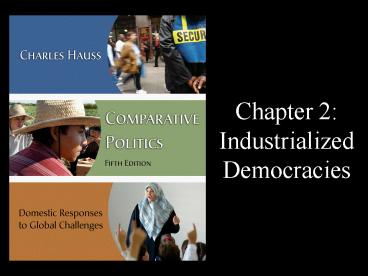Chapter 2: Industrialized Democracies - PowerPoint PPT Presentation
1 / 24
Title:
Chapter 2: Industrialized Democracies
Description:
Why is there so much debate about public policy in industrialized democracies now? ... and cynicism and skepticism toward the media, politics, and politicians. ... – PowerPoint PPT presentation
Number of Views:163
Avg rating:3.0/5.0
Title: Chapter 2: Industrialized Democracies
1
Chapter 2 Industrialized Democracies
2
(No Transcript)
3
(No Transcript)
4
- Industrialized Democracy the richest countries
with advanced economies and liberal states.
5
Four Elections
- United States 2004
- Great Britain 2001
- France 2002
- Germany 2002
6
Common and Not So Common Themes
- Elections determine who governs
- Elections are not about basic principles
- Dissimilarities
- Electoral systems direct, indirect,
proportional, plurality - Separation of powers fusion of powers
7
Thinking About Democracy
- The Basics
- What is democracy?
- Basic Rights
- Competitive Elections
- Rule of Law
- Civil society and Civic Culture
- Capitalism and Affluence
- Which countries are democracies?
8
(No Transcript)
9
Thinking About Democracy
- Key Questions
- Why did democracy emerge?
- Why has it become durable recently?
- Why is there so much debate about public policy
in industrialized democracies now? - Why has that debate not led many people to
question their regimes or democracy itself?
10
The Origins of the Democratic State
- Origins of democratic thought
- The early democracies individualism, capitalism,
Protestantism, scientific revolution, and
exploration - Hobbes
- Laissez-faire
- Locke
- Suffrage
11
(No Transcript)
12
The Origins of the Democratic State
- Building Democracies
- In Europe and, to a lesser degree, North America,
the way democracy developed was largely a result
of the way countries and their rulers handled
four great transformations over the last five
hundred years - The creation of the nation and state itself
- The role of religion in society and government
- The development of pressures for democracy
- The industrial revolution
- Cleavages
- Authoritarian Leaders, Fascism, and WWII
- The Cold War
13
Political Culture and Participation
- The Civic Culture?
- Political Parties and Elections
- Catch-all Parties
- New Divisions
- Gender
- Post-industrial
- Post-materialist
- Realignment?
- Interest Groups
- Political Protest
14
(No Transcript)
15
(No Transcript)
16
(No Transcript)
17
The Democratic State
- Presidential and parliamentary systems
- Only one presidential system the U.S.
- Presidential compromise the norm and rapid
decision making difficult to prevent abuse of
power - Parliamentary secure majority party or
coalition, the prime minister rarely has to
compromise as much as U.S. President, which
allows their government to act more quickly and
decisively. Fused, not separated. - Cabinet responsibility principle that requires
a prime minister and government to retain the
support of a parliamentary majority. - Votes of confidence a vote in which the members
express their support for (or opposition to) the
governments policies. If it loses, the
government must resign.
18
(No Transcript)
19
(No Transcript)
20
The Rest of the State
- High-level civil servants in the bureaucracy
- Leading interest group representatives
- Iron Triangle A variety of close relationships
between business leaders, politicians, and civil
servants. - Those states with the most integrated elite, like
France, Germany, and Japan, have been among the
most successful economically.
21
(No Transcript)
22
Public Policy
- The interventionist state governments in
industrialized democracies that pursue an active
economic policy. - Basic health care and education
- Subsidized and/or free education at all levels
including universities - Unemployment compensation
- Pensions and other programs for seniors
- Foreign policy
23
Feedback
- Telecommunications revolution It is getting ever
easier for people to find out about politics at
home and abroad. - People view the world in their own terms, which
may be different from those of either the
politicians or the media. Declining interest and
cynicism and skepticism toward the media,
politics, and politicians.
24
Conclusion
- In uneven and imperfect ways, democratic regimes
achieve a series of balances better than any
other type of government - Between the governors and the governed
- Between the political world and the rest of
society - Between unbridled capitalism and the interests of
those who do not benefit (much) from it - Between personal freedoms and the need to
maintain order and forge coherent public policy































